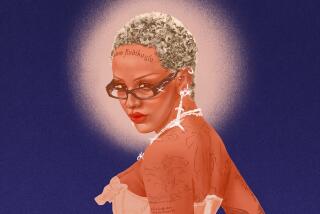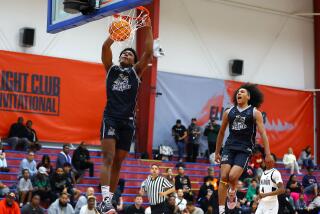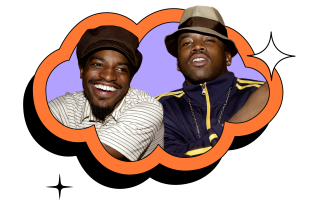M.C. Hammer Gets Into Swing of Things
- Share via
If anyone has Baseball Fever, it’s today’s generation of rock stars.
Joan Jett sends mash notes to the boys in the Baltimore Orioles bullpen. Bob Seger is a habitue of Tiger Stadium. Huey Lewis & the News adore the Oakland A’s so much they stop in to sing the national anthem. For years, George Thorogood refused to tour during baseball season so he could play semipro ball. And of course, John Fogerty’s such a die-hard fan that he titled his 1985 comeback album “Centerfield.”
With the championship series starting Tuesday, we turned to a performer with Serious Fan credentials--rap star M.C. Hammer, who is surely the only pop idol who can boast to having been a member of the front office of a major-league baseball team. Discovered in 1972 by ex-Oakland A’s owner Charles Finley while doing a dance routine in the ballpark parking lot, the teen-ager was awarded a prestigious--if largely honorary--title of A’s executive vice president.
“In a lot of ways I was Charlie’s right-hand man,” says Hammer, who got his stage name from A’s ballplayers for his striking resemblance to (Hammering) Hank Aaron. “I was just a kid, doing my James Brown impression--the splits and everything--when Charlie took me up to his private box and put me to work.
“I was a batboy when the team went on the road. I ran errands for everybody. And when Charlie was back in Chicago, where he lived, I’d broadcast the A’s games to him from Oakland, doing the play-by-play myself.”
Hammer became friends with many A’s greats like Vida Blue and Joe Rudi. And it’s no surprise that he earned a nickname (originally Little Hammer) hanging around players with such colorful monikers as Catfish Hunter and Blue Moon Odom. A good schoolboy athlete, Hammer tried out for the San Francisco Giants in 1982, but couldn’t win a spot in their farm system.
After attending East Los Angeles College, he turned to his other love: rap music. His Oakland sports connections paid off. A pair of A’s players, Mike Davis and Dwayne Murphy, helped Hammer start his own label, where he had enough success to be picked up by Capitol Records, his current home. Having seen the inner workings of both professional athletics and the music industry, the rapper has spotted a lot of similarities.
“Every kid wants to grow up to be a star athlete,” says Hammer. “But you can have a lot longer career, with a lot less wear and tear on your body, as a musician. You’re also a lot more recognizable. I’m on ‘MTV Raps’ six days a week. Consequently, when I go into an airport, kids recognize me right away. Unless you’re a superstar like Darryl Strawberry--or unless you’re 7-feet tall--that doesn’t happen to most athletes.”
Hammer remains a loyal A’s fan. But when Pop Eye asked if he was ready to break the last hip-hop barrier--to perform a rap version of the national anthem--he sounded a cautious note. “It can be done--I know, ‘cause I could do it,” he said, doing an impromptu boom-box recital of the song’s first verse. “But it’s very risky. You’d really have to swing the beat, and America could really resist you on that. I could see being a little shaky out there.”
Hammer laughed. “You know how baseball fans like to boo. And the booers could really be booing me on that one!”
More to Read
Go beyond the scoreboard
Get the latest on L.A.'s teams in the daily Sports Report newsletter.
You may occasionally receive promotional content from the Los Angeles Times.










